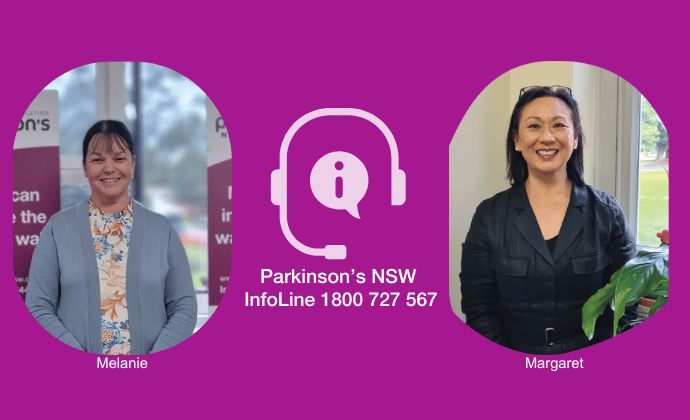A monthly review of the top five issues raised in calls to the Parkinson’s NSW InfoLine team (call 1800 727 567).
- Getting Moving After Winter
With the colder months behind us, many people living with Parkinson’s find it challenging to restart regular movement after a quieter winter. It’s important to take it gently and to ease back into exercise, listen to your body, and set realistic goals. Even short walks, light stretching, or a gentle class can help rebuild strength and confidence. If you’re unsure where to start, our InfoLine can connect you with Parkinson’s specific exercise programs and physiotherapists who understand your needs.
- Voluntary Assisted Dying (NSW)
This month we’ve had some sensitive conversations around Voluntary Assisted Dying (VAD). Understandably, it can be a confronting and emotional topic for people living with Parkinson’s and their families. VAD laws are now active in most states across Australia, but the details can vary depending on where you live.
What we often hear from callers is a need for clear, compassionate information. People want to understand eligibility criteria, how the process works, and what support is available, both medically and emotionally, when these conversations arise. Others simply want a safe space to talk about the ethical and personal considerations without judgement.
If VAD is something you’ve been thinking about, you don’t need to go through those thoughts alone. Your neurologist, GP, or Parkinson’s Nurse can help guide you with information relevant to your situation. And if you’d just like to talk it through or ask questions confidentially, our InfoLine team is always here to listen and provide support.
- Dystonia
Dystonia involves involuntary muscle contractions that cause twisting, irregular postures, or repeated movements. Around 30% of people with Parkinson’s experience dystonia, with cervical dystonia (affecting the neck) being the most common. It can appear in specific situations, for example, calf tightness or toe cramping while running, “writer’s cramp” when holding a pen, or hand and arm symptoms while brushing teeth or eating.
Because these symptoms often don’t appear during a medical appointment, it’s important to tell your neurologist if you notice them. Management strategies may include adjusting levodopa around exercise, changing sensory input (such as using toe separators), running on softer surfaces, or altering cadence. Our InfoLine can provide further information and referral pathways.
- The Role of Speech Pathologists
Speech pathologists don’t just help with speech clarity; they can also support swallowing and safe eating. This might include strategies for swallowing tablets, managing coughing or choking after meals, or making small changes in diet and posture to reduce risk. Early referral is best, as interventions can prevent complications and improve quality of life. The InfoLine can link you with speech pathologists who understand Parkinson’s.
- Medication Formats
As Parkinson’s progresses, it can become harder to take medications in tablet form. Fortunately, there are other options such as dispersible tablets, patches, intestinal gel pumps, and subcutaneous infusions. These alternatives can support more consistent symptom control and reduce the burden of frequent pill-taking. If you’re finding tablets difficult to manage, talk with your neurologist about what might be suitable. For more information and referral to specialists experienced in advanced therapies, call the InfoLine.






